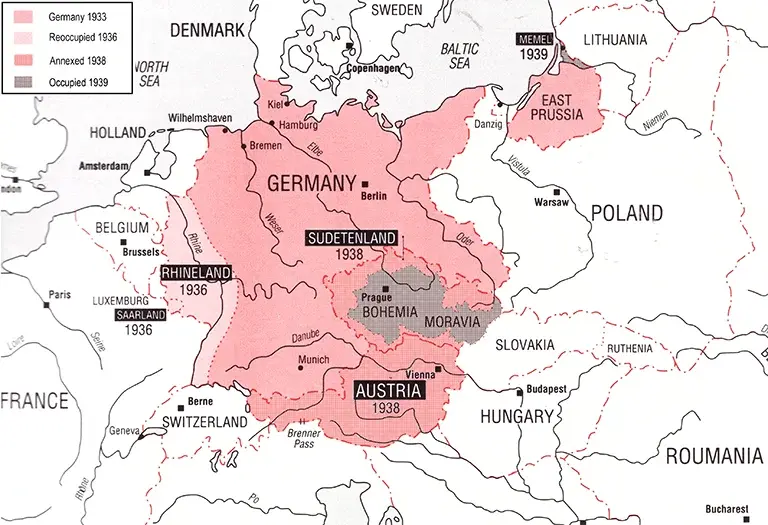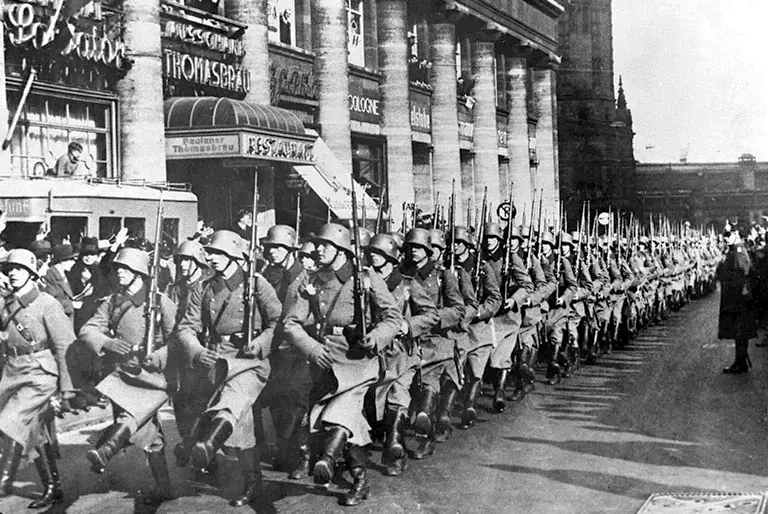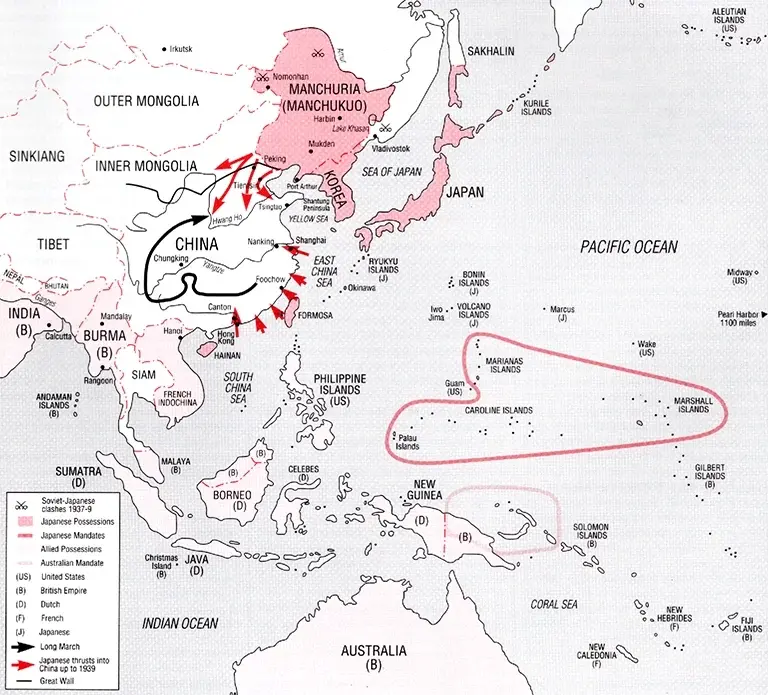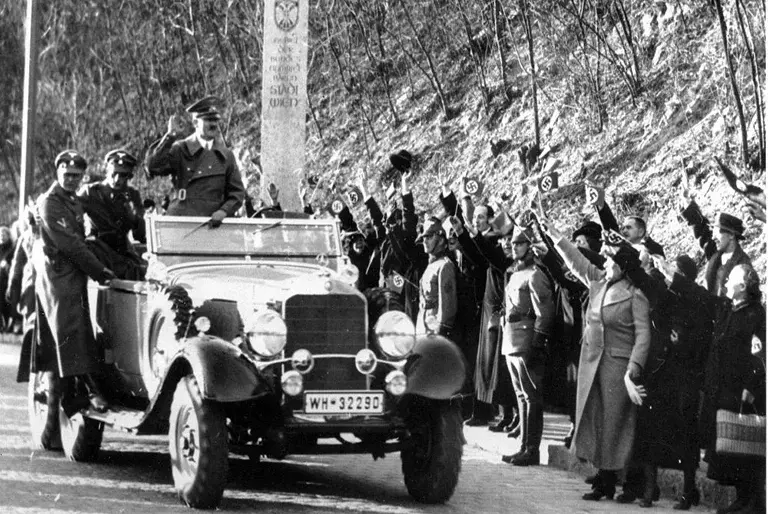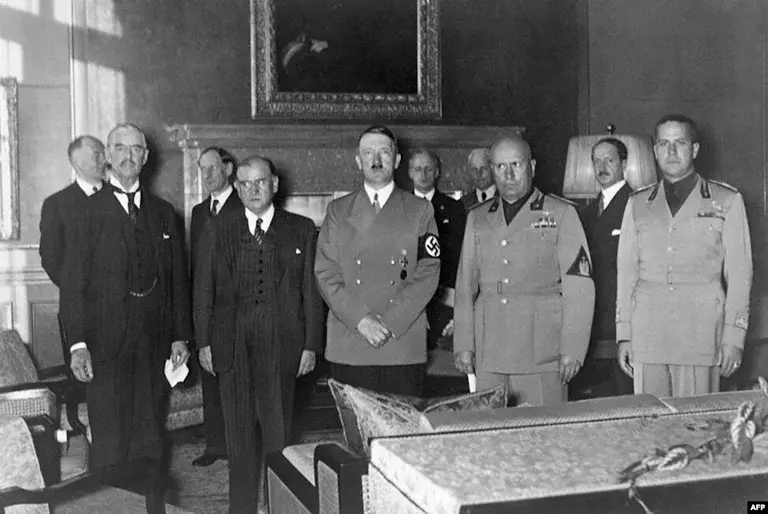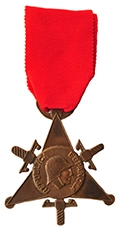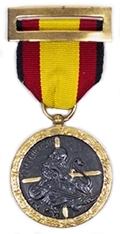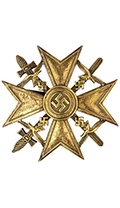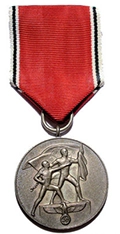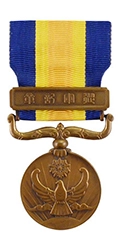19th January 1939
Hjalmar Schacht, the president of the Reichsbank, is dismissed by Hitler after cautioning that Germany's rearmament program posed a threat to the economy.
30th January 1939
On the 6th anniversary of the Nazi party coming to power, Adolf Hitler delivers a two-hour speech at the Kroll Opera House to the Reichstag delegates. He speaks about the successes of the Party, but towards the end, he makes a statement that would later be seen as a prophecy. "Today I will once more be a prophet: If the international Jewish financiers in and outside Europe should succeed in plunging the nations once more into a world war, then the result will not be the Bolshevization of the earth, and thus the victory of Jewry, but the annihilation of the Jewish race in Europe!"
13th March 1939
Germany demands that the Czechoslovaks dismiss the anti-Nazi ministers in their government.
14th March 1939
With the support of Germany, Dr. Josef Tiso declares Slovakia's independence. However, in reality, Slovakia is just a puppet state controlled by Germany, with its foreign policy being determined in Berlin.
To prevent a planned declaration of independence and annex the territory for itself, Hungary moves troops across the border and into the Czechoslovakian province of Ruthenia.
Czech President Emil Hacha, having requested a meeting with Hitler, arrives in Berlin that evening to discuss the issues of Slovakia and Ruthenia. However, he is kept waiting while Hitler finishes watching a movie.
15th March 1939
At 1:15am, President Hacha is finally seen by Hitler and is presented with a number of demands under the threat of force. He is required to acknowledge Slovakia's independence and consent to the immediate occupation of Bohemia and Moravia by German troops, which would become a German protectorate. The remainder of Czechoslovakia is to be annexed by Hungary and Poland. With few options available, President Hacha agrees, and German troops march into Prague without opposition later that morning. Ruthenian authority's declare their independence from Czechoslovakia and request immediate protection by Germany from the invading Hungarians. The Germans decline and advise them not resist the Hungarian troops.
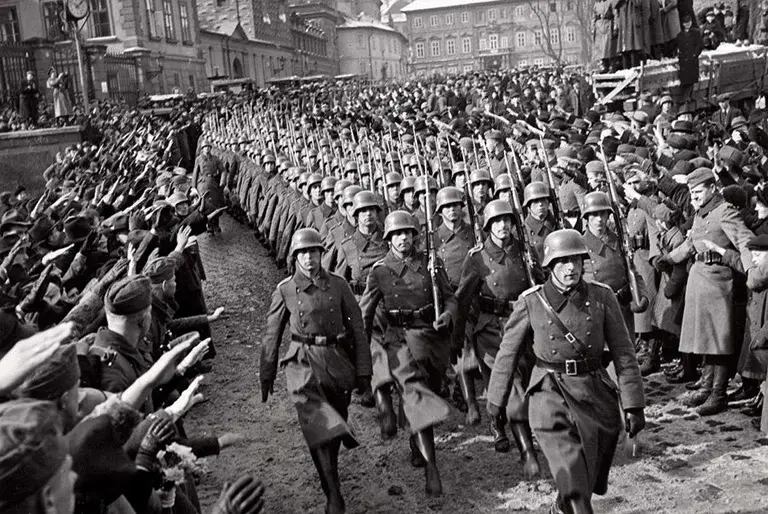
German troops move into Prague Castle following the Czechoslovak President Emil Hacha agreeing to Czechoslovakia becoming a protectorate of Germany.
16th March 1939
From Prague Castle, Hitler announces the creation of the 'Protectorate of Bohemia and Moravia'. To lend an air of credibility, Hacha is named State President, but this is merely for show. The real power is held by the Reichsprotektor, SS-Obergruppenführer Konstantin von Neurath.
20th March 1939
German foreign Minister Ribbentrop, meeting with his Lithuanian counterpart Juozas Urbsys, demands that the City of Memel and the Klaipeda Region is returned to Germany or the country would be invaded.
22nd March 1939
With the Lithuania acquiescing to German demands early that morning, the Klaipeda Region is annexed by Germany.
23rd March 1939
At 1:00am Germany and Lithuania officially sign a treaty declaring that the Klaipeda Region and Memel are to be voluntarily transferred back to Germany. This is retrospectively back dated to be effective from the 22nd March. Adolf Hitler arrives in Memel later that day having travelled across from Swinemünde on board the Heavy Cruiser Deutschland.
25th March 1939
Italy presents Albania with an ultimatum, demanding that Italian forces should be given control strategic points in the country and that a customs union should be introduced between them. An affirmative response was required by 6th April 1939.
31st March 1939
Neville Chamberlain announces to the House of Commons "In the event of any action which clearly threatened Polish independence, and which the Polish Government accordingly considered it vital to resist with their national forces, His Majesty's Government would feel themselves bound at once to lend the Polish Government all support in their power. They have given the Polish Government an assurance to this effect. I may add that the French Government have authorised me to make it plain that they stand in the same position in this matter as do His Majesty's Government."
6th April 1939
Following talks with the Polish foreign minister, it was agreed to formalise the assurance of support for Polish independence as the Anglo-Polish military alliance once agreement of the text had been reached.
7th April 1939
Having not received a satisfactory response from Albania, Italian troops begin their invasion landing troops at various points along the coast.
10th April 1939
With most of Albania now under Italian control King Zog flees to Greece.
12th April 1939
Italy sets up a fascist government in Albania under Shefqet Verlaci, which then votes to unite the country with Italy and proclaim King Victor Emmanuel III the King of Albania.
13th April 1939
Following the occupation of Albania by Italy, Britain and France extend their guarantee of independence to both Greece and Romania.
20th April 1939
Adolf Hitler's 50th birthday is celebrated as a national holiday throughout Germany, with a grandiose display of events in Berlin centred around Hitler and organized by Minister of Propaganda Joseph Goebbels. The celebrations include a military parade featuring 40,000 to 50,000 German soldiers and a flypast of 162 Luftwaffe planes. The parade lasts for more than four hours and was attended by 20,000 official guests and several hundred thousand spectators. It was partly intended to serve as a warning to the Western powers of Germany's new found military prowess.
20th August 1939
During a meeting with his generals at Berchtesgaden, Hitler declares that "the destruction of Poland.. would begin on Saturday, 26th August at 4am."
23rd August 1939
The Ribbentrop-Molotov Pact is concluded between Germany and the Soviet Union, negotiated and named after their respective foreign ministers, Ribbentrop and Molotov. The agreement contained 7 public articles and 1 secret protocol:
1) Each nation would not attack one another, whether severally or jointly with other powers.
2) Provided that if an outsider attacked either, the signatories would not lend support.
3) Promised an open channel of communication between the Soviet Union and the German Reich.
4) That neither would join any grouping of powers aimed directly or indirectly at the other.
5) Affirmed that disputes would be settled by an arbitration commission.
6) The agreement would last ten years, with an automatic five-year extension, if neither side objected.
7) The Non-Aggression Pact would come into force immediately upon signature by Ribbentrop, Molotov, and Stalin. The Secret Protocol established Soviet and German spheres of influence in Eastern Europe. It recognized that Estonia, Latvia, Finland and Bessarabia were within the Soviet sphere of influence. Poland was to be divided along the Narev, Vistula, and San Rivers. The protocol was later amended to include Lithuania and the city of Vilnius within the Soviet sphere of influence.
Neville Chamberlain warns Germany that Britain will honour its statement of the 31st March which guaranteed Polish independence.
24th August 1939
The British Parliament is recalled from its Summer recess to pass the Emergency Powers (Defence) Act 1939 in response to the signing of the Ribbentrop-Molotov Pact the previous day. This act immediately grants the government special legislative powers to implement defence regulations.
25th August 1939
The Polish-British Common Defence Pact which guarantees Polish independence, is finally signed committing both Britain and France to come to the defence of Poland in the event of an attack. Hitler hesitates following the signing and postpones the start date of the invasion until the 1st September. Mussolini communicates to Hitler that Italy isn't prepared for war at this time.
26th August 1939
Following the work of Birger Dahlerus, a Swedish businessman and envoy sent by Goring to Britain. Lord Halifax composed a letter to Hitler. In the letter, he expressed Britain's desire to reach a peaceful settlement. This convinced Hitler that the Western Allies would probably not declare war on Germany if they invaded Poland. Furthermore, if they did declare war, they would be willing to negotiate a compromise that favoured Germany after its conquest. Hitler announces that Germany would respect the neutrality of Belgium, Holland, Luxembourg and Sweden.
29th August 1939
The German government expresses its willingness to begin talks with Poland regarding the return of Danzig, the Polish Corridor/West Prussia to the Reich, and the protection of the German minority in Poland. However, Poland must send a representative with full authority to sign an agreement to Berlin by the end of the following day. The Polish Minister of Foreign Affairs, orders the mobilization of the Military. However, due to pressure from Great Britain and France, the mobilization is called off soon after.
30th August 1939
Polish Commander-in-Chief, Marshal Smigly-Rydz orders the Polish Navy's destroyer squadron consisting of the Burza, Blyskawica, and Grom to execute 'Operation Peking' and make their way to British ports. The plan being that they would assist the Royal Navy in transporting supplies to Poland. He also issues orders to mobilize all Polish reserve forces.
31st August 1939
Polish Ambassador Jozef Lipski visited Ribbentrop to express Poland's willingness to negotiate. However, upon discovering that Lipski did not have the full authority to sign an agreement, Ribbentrop sends him away. Subsequently, German radio announced that Poland had rejected Germany's offer and that negotiations with Poland had ceased. Later in the evening, the Germans initiated 'Operation Himmler', a series of false flag attacks on German targets near the German-Polish border. These incidents were made to appear as if they were carried out by the Polish army, providing a justification for the German invasion. The most well-known of these attacks was on the Gleiwitz Radio Tower in Upper Silesia. Prisoners, including some from Dachau Concentration camp, were dressed in Polish uniforms and shot dead at the scene to make it seem like they had been killed whilst attacking the radio station.
Hitler now issues the order that Directive Number 1, the attack against Poland, is to begin at 4:45am the next morning.


